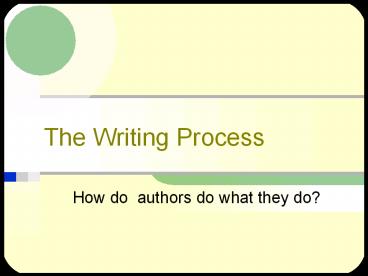The Writing Process PowerPoint PPT Presentation
1 / 17
Title: The Writing Process
1
The Writing Process
- How do authors do what they do?
2
There is no wrong way to write.
- except not to start.
3
The Writing Process
Pre-Writing
Editing
- REVISING
Composing
Publishing
4
Pre-Writing
- Purpose audience
- Who am I writing for?
- Do I want to
- Entertain?
- Persuade?
- Inform?
- Vent?
- Create?
- Journal?
5
Pre-Writing
- How can I decide what to write about?
- Have a brainstorming session.
- Do a free-write.
- Consider your purpose audience.
- Write what you would like to read about!
6
Pre-Writing
- How can I find out more about it?
- Make a list of questions.
- Search the internet.
- Read books.
- Interview people.
- Check out differing opinions.
- Watch a documentary.
- ..and remember to take notes.
7
Pre-Writing
- How do I get it in order?
- Webbing
- Outlining
- Graphic Organizers
8
Composing
- Pen, pencil or keyboard?
- Planned working from an outline
- Freeform start writing and see what happens
Discipline Writing is hard work! Keep trying.
9
"Writers spend all their time preoccupied with
just the things that their fellow men and women
spend their time trying to avoid thinking about
.... It takes great courage to look where you
have to look, which is in yourself, in your
experience, in your relationship with fellow
beings, your relationship to the earth, to the
spirit or to the first causeto look at them and
make something of them." Harry Crews
10
Composing
- While writing the first draft
- Dont be too critical of yourself.
- Get your ideas on paper.
- Remember, you can always fix mistakes later.
- No matter how long it has to be, you still write
it one word at a time.
11
Revising
- Ideas Organization
- Does it make sense?
- What can you cut?
- What should you add?
- Choose where to magnify the moment
- Insert concrete, specific, unique and important
details - Should you change the order?
12
James Michener, best-selling author, said
- "I'm not a very good writer, but I'm an
excellent rewriter."
13
Revising
- Voice and Word Choice
- Appropriate tone for audience
- Exactly the right words
- Vivid, active verbs
- Specific nouns
- Chosen connotations
- Effective humor
14
Revising
- Sentence Fluency
- Smooth flow (read aloud to check)
- Variety in sentence length and style
- Clear meaning
15
Editing
- Conventions to check
- Spelling, capitalization, paragraphing and
punctuation - Sentence structure (no run-ons or fragments)
- Grammar and usage
- No missing or extra words
- Book/movie titles underlined or in italics
16
Publishing
- Share What You Wrote
- Post on web page or blog
- Mail or give to friends or family
- Submit to newspaper or magazine
- Send to editor or agent
- Present to audience
17
The Writing Process
Pre-Writing
Editing
- REVISING
Composing
Publishing

